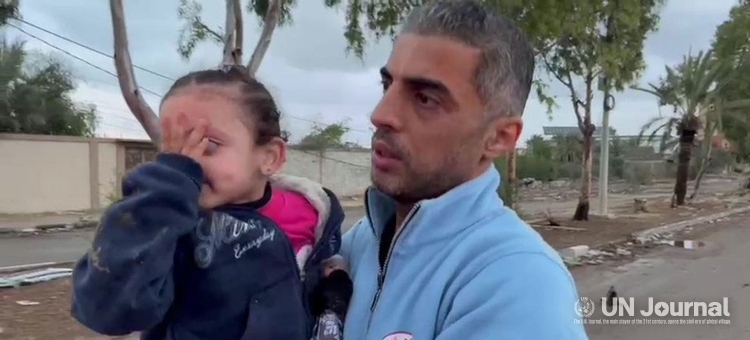By UN Journal Lee Kap-soo
Amid ongoing bombardment in the Gaza Strip, UN agencies and humanitarian partners continue to provide desperately needed food, water, healthcare and other services to the more than two million people living there.
This Thursday (Dec. 7) marks two months since conflict erupted after Hamas militants stormed southern Israel, killing some 1,200 people and seizing more than 200 hostages, prompting Israel to launch a massive military operation in Gaza.

Martin Griffiths, UN Humanitarian Coordinator and head of its emergency relief office, OCHA, on Thursday upheld the commitment of aid agencies to remain in the besieged enclave and support the population. However, he warned that the humanitarian plan to protect civilians is “in tatters” and no place is safe anymore.
Our colleagues at OCHA have been speaking to humanitarian workers on the frontlines of the response, many of whom are Gaza residents themselves:
Mouhammed, the director of emergency and disaster management at the Palestine Red Crescent Society (PRCS), wakes up at 6:30 AM, catching only about three hours of sleep these days. He shares a room in the emergency operation centre in the north of Gaza Strip with 25 PRCS volunteers.
Since 7 October, intensified hostilities in Gaza have led to grave humanitarian consequences leaving tens of thousands dead and injured across the Strip. Homes, schools, medical facilities and other infrastructure have also been destroyed.
During these challenging times, PRCS has been one of the main actors providing support in rescue operations and assistance, in addition to facilitating the entrance of humanitarian assistance via Rafah crossing.
By 7 AM, Mouhammed's already dividing responsibilities among teams.
“We recover bodies, transfer the injured and people with cancer or kidney diseases to hospitals and evacuate civilians especially the elderly and children to less dangerous areas. We also support on searching for missing people and reuniting families who are scattered across the Strip,” Mouhammed says.
“One of the scenes that will forever stay with me is when we admitted a severely injured child who was still holding onto a clean loaf of bread. She insisted that we keep it with her, as that was meant for dinner.”
Mouhammed hasn’t seen his wife and three children, who were displaced to the south when the hostilities began. Recurrent power and telecommunication cuts, due to fuel shortages, have made it difficult for scattered families to stay connected.
“I miss those moments with my family, cherishing their laughter and seeing the joy on their faces,” Mouhammed says.
Like Mouhammed, Dr. Ahmed Muhanna, an anesthetist and the director of Awda Hospital in Tal Al Zataar Camp in the north, hasn’t seen his three children and wife since the start of the war.
